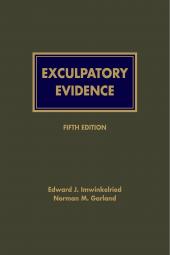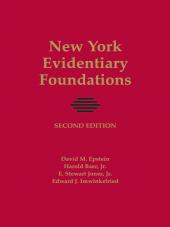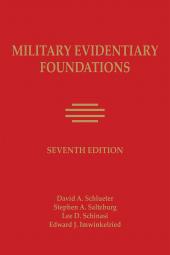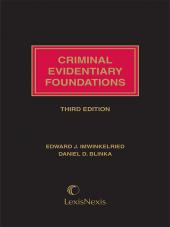Exculpatory Evidence: The Accused's Constitutional Right to Introduce Favorable Evidence
Select a format
 International Order Inquiry
International Order Inquiry
Select subscription type
Terms & conditions
Subscribers receive the product(s) listed on the Order Form and any Updates made available during the annual subscription period. Shipping and handling fees are not included in the annual price.
Subscribers are advised of the number of Updates that were made to the particular publication the prior year. The number of Updates may vary due to developments in the law and other publishing issues, but subscribers may use this as a rough estimate of future shipments. Subscribers may call Customer Support at 800-833-9844 for additional information.
Subscribers may cancel this subscription by: calling Customer Support at 800-833-9844; emailing customer.support@lexisnexis.com; or returning the invoice marked "CANCEL".
If subscribers cancel within 30 days after the product is ordered or received and return the product at their expense, then they will receive a full credit of the price for the annual subscription.
If subscribers cancel between 31 and 60 days after the invoice date and return the product at their expense, then they will receive a 5/6th credit of the price for the annual subscription. No credit will be given for cancellations more than 60 days after the invoice date. To receive any credit, subscriber must return all product(s) shipped during the year at their expense within the applicable cancellation period listed above.
The total price includes the product(s) listed in the Order Form and any Updates for a limited period (minimum period of 30 days) after the order is placed ("Order Window"). Shipping and handling fees are not included in the grand total price.
All shipments may be returned, at subscribers' expense, for full credit of the Price within 30 days of receipt.
Shipments may not be returned, and no credits will be issued, more than 30 days after receipt.
After the Order Window, subscribers will receive notice of Updates along with the then-current grand total price and order process as Updates become available. Subscribers will only be shipped those Updates they specifically request.
Product description
View a sample of this title using the ReadNow feature
Exculpatory Evidence, Fourth Edition offers a comprehensive study of the evolution of case law defining the scope of the constitutional right to present exculpatory evidence, which has been used to override virtually every type of evidentiary exclusionary rule. The authors point out incisive constitutional arguments and effective trial defense strategies to foil evidentiary privileges and put the prosecution on guard.
Don't rely on the exclusion of prosecution evidence to earn an acquittal. Your client's future depends on your ability to present the best possible defense. That means offering all the favorable evidence you can - even evidence that is technically inadmissible under exclusionary rules or privileges.
eBooks, CDs, downloadable content, and software purchases are noncancelable, nonrefundable and nonreturnable. Click here for more information about LexisNexis eBooks. The eBook versions of this title may feature links to Lexis+® for further legal research options. A valid subscription to Lexis+® is required to access this content.
Table of contents
Chapter 1 Introduction
Chapter 2 The Existence and Extent of the Accused's Constitutional Right to Present Evidence
Chapter 2A The Existence of a Civil Litigant's Constitutional Right to Present Evidence
Chapter 3 Procedural Restrictions on the Admissibility of Defense Evidence
Chapter 4 Rules Rendering Persons Incompetent as Witnesses at Trial
Chapter 5 Rules Excluding Logically Irrelevant Evidence
Chapter 6 Rules Requiring Proof of the Underlying Logical Relevance of Evidence: The Personal Knowledge and Authentication Doctrines, Including the Validation of Scientific Evidence Rules of Logical Evidence
Chapter 7 Legal Relevance Doctrine Excluding Evidence Due to Probative Dangers Such as Prejudice and Time Consumption
Chapter 8 Legal Relevance Rules Limiting Admissibility of Evidence Logically Relevant to Impeach Adverse Witnesses
Chapter 9 Legal Relevance Rules Limiting The Admissibility of Evidence Logically Relevant to the Historical Merits
Chapter 10 Common Law and Statutory Privileges That Exclude Logically Relevant Evidence to Promote Extrinsic Social Policies
Chapter 11 Privileges Which Exclude Logically Relevant Information to Protect the Constitutional Rights of Private Persons
Chapter 12 Government Privileges
Chapter 13 The Best Evidence and Opinion Rules Excluding Unreliable Testimony
Chapter 14 The Hearsay Rule Excluding Unreliable Testimony
Chapter 15 Defense Advocacy for the Accused's Right to Present Evidence
Chapter 16 Conclusion
Appendices
Bibliography
Table of Cases
Index
 Lexis Nexis
Lexis Nexis 



